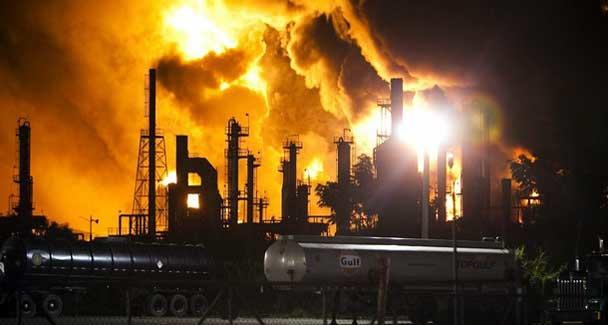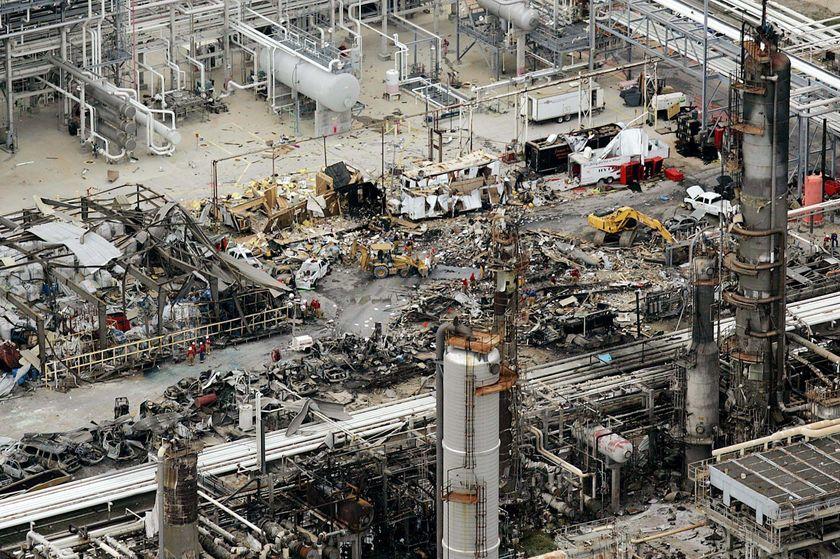Texas City Refinery explosion in 2005 has been considered one of the worst industrial accidents in the recent times. The oil refinery, which was owned by BP at that time, exploded violently while several employees were within the plant. According to Adeola (2011), Texas City Refinery explosion was an accident that occurred out of negligence. The reports said that a hydrocarbon vapor was ignited by an engine, leading to a massive explosion. Fifteeen people died instantly, and over 170 others taken to hospital with serious injuries.
Causes
Chemical Safety and Hazard Investigation Board and many other environmental bodies investigated the incident and their report indicated that the explosion occurred because heavy hydrocarbon came in contact with a source of ignition. The report blamed BP for inadequate structures at the place, and lack of engineering ethics in running the plant. Although the release of the heavy hydrocarbon was accidental, and could occur in any refinery plant, the report blamed the firm for its poor infrastructural investments.
Ethical implications of the Disaster
Texas City Refinery Explosion is one of the worst industrial accidents that have raised ethical issues among different stakeholders. According to Adeola (2011), accidents are occurrences that happen when they are least expected, but measures should always be taken to minimize their occurrence. As mentioned above, several government agencies and independent bodies investigated the explosion and the blame was fully laid on BP. This company was trying to cut cost of its operations. For this reason, the firm ignored various measures that it was supposed to observe. For instance, the technical failures that were identified as the causes of the accidents- such as poor infrastructure- were directly related to organizational failure.
This disaster had massive ethical implications on the firm and other stakeholders in this industry. Fifteen people lost their lives because of this accident, and over 170 people sustained serious injuries. There was a massive destruction of property within this plant. These negative effects would have been avoided if the management maintained values in its operations. The act of ignoring the need to improve the infrastructure within the plant because of cost-cutting strategies was unethical. The management exposed its employees to massive risks because it was determined to reduce operational costs. One of the immediate implications that the accident had on this firm was a thorough investigation on its operations that revealed several lapses. The investigation revealed that there were several other unethical practices going on within this plant that could have caused the accident.
For example, the plant was run without some of the necessary equipment because the management had failed to make replacements as was necessary. According to Khanna (2005), it is the moral responsibility of a firm to ensure that all its facilities are in a good state to support its operations. Sometimes government agencies may not realize how obsolete these instruments are, and it is at this stage that morality is expected to reign. However, this was ignored, and this brought heavy consequences to the firm.
Ethical behavior
It was an ethical behavior for this firm to allow free and fair investigation to be conducted by independent bodies to determine the real cause of the accident (Hogan & Burstein, 2007). When the investigation realized that an act of ignorance caused the accident, heavy penalties were put on Texas Refinery. It was a legal and ethical obligation of this firm to pay the penalties as a consequence to its act of negligence. The management realized the important of improving the infrastructure, and reports indicated that it purchased some new equipment to improve efficiency and safety of the employees
Unethical behavior
Lack of ethics was evident when the management felt that it was not obligated to follow all the requirements put in place by government agencies after the accident. The firm paid part of the penalties but ignored some. This was unethical behavior that could lead the firm back to the court. The management felt that this was punitive approach that it was not ready to follow.
Engineering Ethics
Engineering ethics would be very relevant when analyzing Texas City Refinery Explosion. According to Harris, Pritchard and Rabins (2009), “The field of engineering ethics examines and sets the obligations by engineers to society, to their clients, and to the profession.” Engineers have an obligation to the society, their clients, and to this profession. There is a code of conduct that they should observe when conducting various activities in their fields.
There are fundamental canons, rules of practice, and professional obligations that engineers must observe in their operations. These values were conspicuously missing in the operations of this firm. The investigations revealed that this engineering plant was operating without a clear supervision from relevant experts. This meant that the technicians within this plant were allowed to supervise their own operations as long as they were able to operate the machines and make the necessary output.
This was even worsened by the fact that some employees without engineering knowledge were allowed to operate machines within the plant without a clear guideline. This is an ethical behavior based on engineering code of conducts. The refinery is a volatile area that should be closely monitored by experts regularly. The engineers of this firm, especially those that were responsible for running the firm, should be held liable for their unethical behavior. Because of their unethical practices, someone was able to ignite an engine within the plant, something contrary to the expectation. This incident even made society develop stiffer penalties than before, for those who do not follow the law.
Prevention of industrial accidents through ethical behavior
Ethical behavior can prevent industrial accidents. When everyone takes their responsibility seriously, it would be easy to address some lapses that may cause industrial accidents. For instance, the management would have helped avoid the accident by meeting their moral obligation of investing in infrastructure within this firm. The engineers who are in charge of operations have the moral obligation of making necessary supervision and ensuring that everyone understood some of the dangers of igniting engines within the plant. If they were ethical enough in their duty to supervise and guide other workers in the plant, the accident could probably not have occurred.
The specific employee who ignited the engine acted unethically. In such volatile engineering plants, there are always well-laid guidelines of how each activity should be addressed in order to save lives. This worker’s behavior was unethical. Act of negligence is also unethical. Employees of this firm failed to raise an alarm over dilapidated conditions of the infrastructure within the plant. It means that when ethics is maintained within a firm, then industrial accidents would be prevented.
Acceptable accidents
According to Bowen (2009), although accidents are undesirable because of their negative consequences, some of them may be acceptable within an industrial plant. Accidents that are not caused by direct human error may not be easy to avoid. Mitigation measures for such accidents should be put in place.
Learning from mistakes
Fleddermann (2012) says that some of the best engineering inventions were made after making numerous mistakes, some of which were fatal. It is, therefore, true that engineers can learn by making mistakes. However, they have to be keen to learn from such mistakes. The mistakes should not be repeated if they are expected to be a learning point.
Making the world safer
Engineers are always dealing with instruments and chemicals that may react violently and cause a lot of harm if care is not taken. However, engineers must appreciate that they are in a position to make the world safer. Road accidents, airplane accidents, and many other industrial accidents can be reduced by engineers. These instruments are developed by engineers. If they commit to improving safety measures, improve monitoring and control when these machines are used, and increase awareness among the public that uses their invention, the world will be a safer place than it is currently.
Conclusion
Texas City Refinery Explosion is one of the serious industrial accidents in the recent history. This accident led to the loss of lives and massive loss of property. A series of investigations revealed that the accident occurred due to negligence of the management and engineers within this plan. It showed that the responsible stakeholders were unethical when addressing their duties. The management failed to improve the infrastructure, while the engineers did not obey the code of conduct they were expected of when operating this plant. Industrial accidents can be significantly reduced if the responsible stakeholders uphold ethics. Everyone should follow all the procedures he or she is expected of when carrying their duties and cases of industrial accidents will be minimal.
References
Adeola, F. (2011). Hazardous wastes, industrial disasters, and environmental health risks: Local and global environmental struggles. New York: Palgrave Macmillan. Web.
Bowen, W. R. (2009). Engineering ethics: Outline of an aspirational approach. London: Springer. Web.
Fleddermann, C. B. (2012). Engineering ethics. Upper Saddle River: Prentice Hall. Web.
Harris, C. E., Pritchard, M. S., & Rabins, M. J. (2009). Engineering ethics: Concepts and cases. Belmont: Wadsworth Cengage Learning. Web.
Hogan, D. E., & Burstein, J. L. (2007). Disaster medicine. Philadelphia: Wolters Kluwer. Web.
Khanna, B. K. (2005). All you wanted to know about disasters. New Delhi: New India Publishing Agency. Web.
Appendix: Images of the Accident

